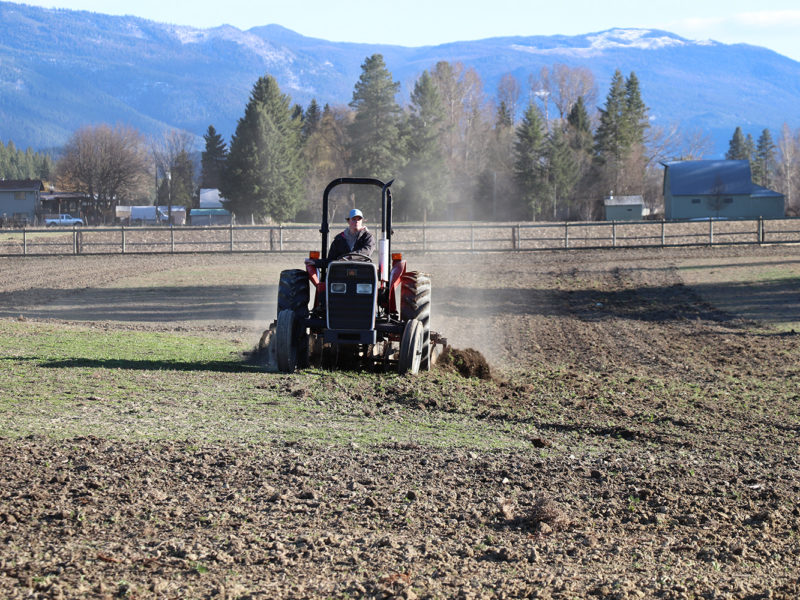VICTORIA – To increase landowner participation in the BC Land Matching Program administered by Young Agrarians, the BC Ministry of Agriculture is drawing on behavioural insights to nudge landowners into leasing their unused farmland to new farmers.
Behavioural scientist Christine Kormos presented details and results of the project at the BIG Difference BC online conference November 6.
Kormos worked with the province’s agriculture ministry as a Mitacs Canadian Science Policy Fellow to develop, implement and evaluate behavioural interventions to target improved access to land among new entrants to agriculture in BC. She is currently working as senior behavioural scientist with the BC Behavioural Insights Group (BC BIG), established by the province in 2016 as “a unit within the BC Public Service Agency that applies behavioural science to complex public policy challenges.”
Other members of the project team included Mikayla Ford (BC BIG), agriculture ministry staff Lindsay Bisschop, Adrian Semmelink, and Lindsay Miles-Pickup.
“Nudge” policies use insights from behavioural science to achieve policy outcomes. They aim to influence people’s decisions by changing the way options are presented to them rather than changing the options themselves.
“Nudges are small tweaks, not policy changes,” explains Eldar Shafir, a psychology professor at Princeton University and keynote speaker at the conference.
“The policy challenge is that farmland is a limited resource in BC, and it is important that farmland be farmed to ensure a strong localized food supply,” says Kormos. “The ministry has used various policy levers to meet this land management goal, such as the Agricultural Land Reserve and the farm class tax threshold.”
Kormos added that there is still an opportunity to optimize the use of farmland in BC, since a significant portion of the farmable land in BC is not currently being used for agriculture.
“However, there is limited access for new farmers,” says Kormos. “There are a couple of key reasons for this. Not only does BC have some of the oldest farmers in the country with more than 58% of the farmers over the age of 55, BC also has some of the most expensive farmland in Canada. It is really difficult for aspiring farmers to enter the agricultural market.”
The BC Land Matching Program, administered by Young Agrarians and funded in part by the BC Ministry of Agriculture, was developed to address this policy challenge by matching landowners with land seekers.
“So far, BCLMP has appealed to land seekers more than landowners,” says Kormos. “There are lots of farmers looking for land, but fewer landowners looking for lessees. Can landowners be ‘nudged’ to participate in the BC Land Matching Program?”
Research with landowners through focus groups and farm visits helped the team understand why landowners weren’t knocking down the door to get into the program.
“Landowners cited a lack of awareness of Young Agrarians and the BCLMP, and of those who were aware, they didn’t see it worth the cost, they had concerns about lack of control and privacy, the hassle, and the lack of clarity around the steps involved,” says Kormos.
“These are major barriers and this is a life-changing behaviour,” explains Kormos. “So, I was not expecting a big response rate.”
Messaging rethink
Postcards sent to selected landowners to advertise the program were redesigned from the original “Got Land? Want Land?” postcard using behavioural insights.
The new design presented leasing as normal by stating that each year, thousands of landowners in BC lease out unused farmland. As social proof and an incentive, a quote from a landowner stating the benefits to the program was added. The messenger effect was modified by giving the postcard a government look and feel.
To address the question about the lack of clarity, the postcards clearly outlined steps in the land matching process.
To humanize the message, a photo of the BC Land Matching program manager with a welcoming message and contact details was added.
Another set of postcards was tailored to specific regions of the province.
The impact of the postcards was evaluated in a randomized controlled trial. They were distributed this summer to select landowners in Metro Vancouver and the Fraser Valley, Central Okanagan and on Vancouver Island. The selected landowners were in the ALR, 65% or more of their parcel was prime agricultural land, less than 100% of the parcel is currently farmed, and it is greater than two acres.
The control group of 544 landowners was sent no postcard. One group of 519 was sent the original postcard. A third group of 508 was sent the behavioural insights-informed postcard, and a fourth group of 511 sent the behavioural insights-informed postcard tailored to their specific regions.
The plan was to measure inquiries to the program by phone or email over the following three months, the number of applications initiated, and change in farmland use by August 2021.
The response rate was lower than expected at 12 inquiries out of 2,082 landowners, or 0.6%. The only landowners who responded by email or phone were in the groups that received postcards modified by behavioural insights. Tailoring the postcard to region had no added benefit. In short, the nudge was effective, but only slightly.
Kormos says if the inquiries translate into matches it would be encouraging, but is it worth the cost?
Kormos suggests that the ministry needs to consider the next steps for improving participation rates.


 Passion and schooling pay off for young grower
Passion and schooling pay off for young grower